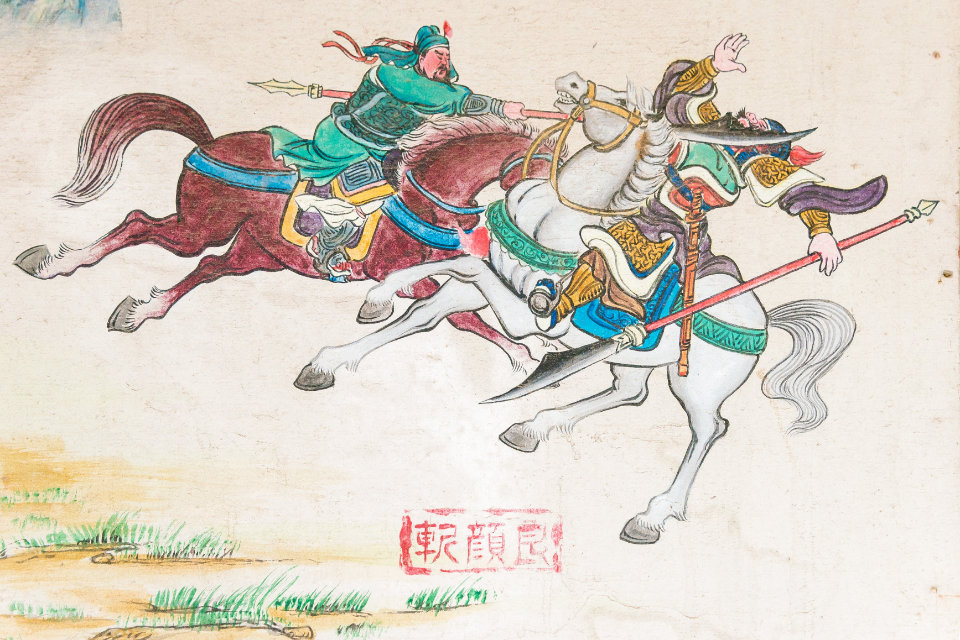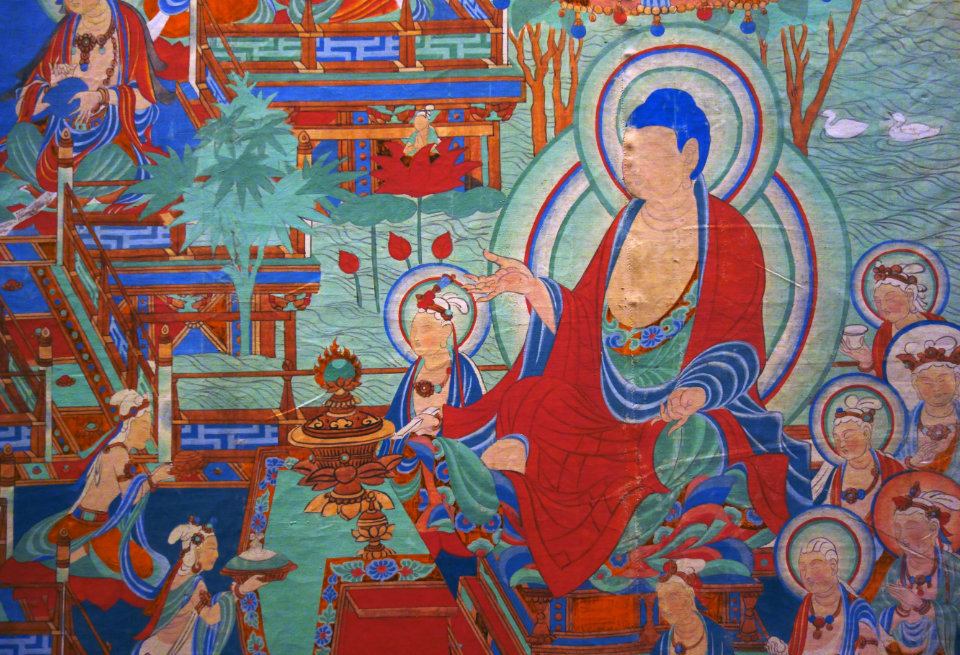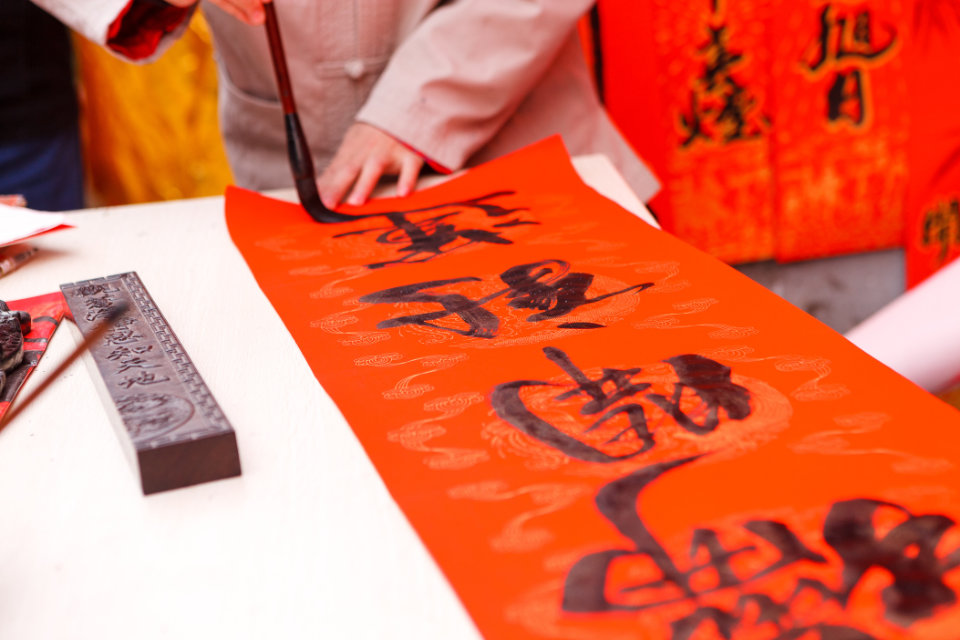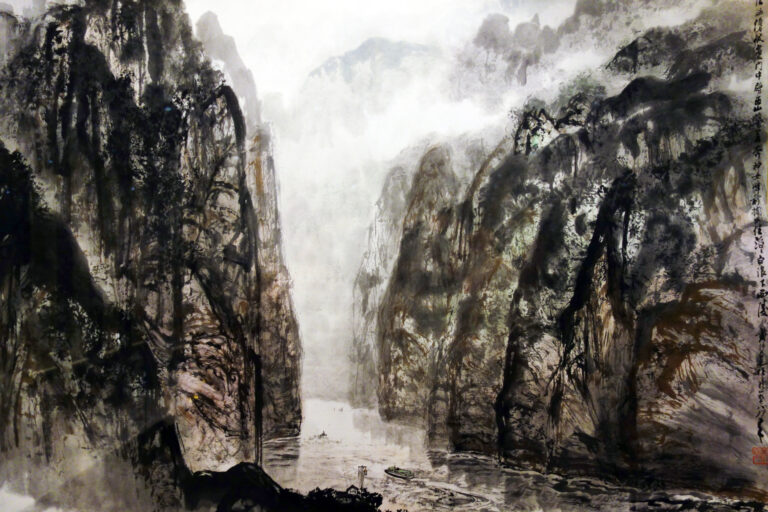Feng Shui, an ancient Chinese practice, emphasizes harmonizing with our surrounding environment to promote peace, prosperity, and positivity. A fundamental aspect of Feng Shui involves the arrangement and selection of items in our homes.
Art, in particular, plays a crucial role in shaping the energy or ‘chi’ of a space. One such essential element is the Feng Shui painting, a tool that can manipulate and channel positive energy throughout our homes when chosen correctly.
In this guide, we delve into how to choose the best Feng Shui painting for your home, enhancing your living space to resonate with your energy and intentions.
As we explore the art of selecting the best Feng Shui painting, we will also touch on other related topics such as numerology, feng shui sleeping direction, money attraction symbols, and the significance of lucky Chinese zodiac signs in 2024.
The principles of Feng Shui extend to all corners of our lives, similar to symbols of health and prosperity. They intertwine and work together, creating a harmonious environment that caters to our unique energy profiles.
Table of Contents
Understanding Feng Shui Art
In Feng Shui, art is not just an aesthetic element; it is a powerful tool to regulate the flow of energy in our spaces.
Similar to the underlying principles of numerology, Feng Shui art is filled with symbolism, from the depiction of landscapes, water scenes, flowers, and mountains, to the choice of colors, every detail matters.
Each component represents different aspects of life and energy, and understanding this symbolism is the first step towards choosing the best Feng Shui painting for your home.
Choosing a Feng Shui Painting in Accordance to Your Chinese Zodiac
The Chinese Zodiac, comprising twelve animal signs, plays a significant role in Feng Shui. It impacts various life aspects, including career, relationships, health, and fortune. The year 2024 is the Year of the Dragon, one of the luckiest Chinese Zodiac signs.
Much like your Feng Shui sleeping direction, your Chinese Zodiac sign can guide you towards art that resonates with your unique energy, bringing in prosperity, health, and good luck.
Here’s how to choose a Feng Shui painting for both males and females of each Chinese Zodiac sign:
- Rat – As symbols of wealth and surplus in Chinese culture, individuals born in the year of the Rat might benefit from paintings depicting abundant harvests or overflowing treasure pots.
- Ox – Symbolizing diligence, persistence, and honesty, Ox individuals might find harmony in landscapes depicting enduring mountains or serene pastures.
- Tiger – Tigers are associated with bravery and competitiveness. Tiger individuals might resonate with paintings depicting bold, vibrant scenes, such as a sun rising or a cascading waterfall.
- Rabbit – Individuals born in the year of the Rabbit, a symbol of gentleness and warmth, might find solace in paintings of serene meadows, calm lakes, or gentle floral arrangements.
- Dragon – Dragons signify power and luck. For those born in the year of the Dragon, paintings featuring majestic mountains or soaring dragons can channel good fortune and success.
- Snake – Representing wisdom and wealth, Snake individuals might benefit from paintings depicting scholarly scenes or hidden treasures.
- Horse – Individuals born under the sign of the Horse, known for their energy and passion, might connect with paintings that evoke movement, like galloping horses or flowing rivers.
- Sheep – Sheep signify peace and harmonious co-existence. For Sheep individuals, tranquil scenes like peaceful pastoral landscapes or harmonious family scenes may bring peace and prosperity.
- Monkey – For clever and versatile Monkey individuals, paintings featuring blossoming flowers or thriving trees can symbolize growth and innovation.
- Rooster – Roosters are symbolic of punctuality and fidelity. Rooster individuals might resonate with scenes of a sunrise or a rooster greeting the dawn.
- Dog – Representing loyalty and responsibility, Dog individuals might connect with paintings of faithful dogs or sturdy mountains, symbolizing unwavering support.
- Pig – As a symbol of wealth, Pig individuals might benefit from art depicting abundant feasts, overflowing treasure chests, or wealthy deities.
Choosing the best Feng Shui painting according to your Chinese Zodiac sign is a way to personalize the positive energy flow in your home, just as one would with other wealth attraction symbols or practices of Feng Shui.

Factors to Consider When Choosing a Feng Shui Painting
Choosing the best Feng Shui painting for your home is not just about your zodiac sign or personal preferences.
Several other factors also play an essential role in attracting positive energy and ensuring prosperity, health, and happiness.
- The Five Elements: Feng Shui is heavily influenced by the Five Elements—wood, fire, earth, metal, and water. The color and subject of your painting should resonate with the element associated with the room’s purpose and the occupants’ personal element.
- The Bagua: The Feng Shui energy map, known as the Bagua, divides your home into nine areas, each representing a life aspect (like wealth, health, or career). The painting you choose should complement the Bagua area’s energy where you place it.
- Personal Connection: The painting should resonate with you on a personal level, making you feel positive, inspired, or relaxed. It’s essential that you feel an emotional connection with the artwork.
- Choosing a Colour Scheme: In Feng Shui, different colours correspond to different elements and energies. For instance, blue represents water and tranquility, while red stands for fire and passion. Green symbolizes wood and growth, and so on. Therefore, the colours in the painting should align with the energy you want to attract. If you want peace and tranquility in your bedroom, opt for paintings with shades of blue. If you want to stimulate conversation and energy in your living room, red can be a great choice.
- Size and Shape of the Painting: The size and shape of the painting should be in harmony with the room. A large painting in a small room can make space feel overwhelmed, while a small painting in a large room can get lost. Similarly, the shape of the painting can also influence the room’s energy. Square or rectangular paintings can bring balance and stability, while round paintings can promote harmony and continuity.
- Choosing a Suitable Feng Shui Painting for Each Room:
- Bedroom: For a bedroom, you should choose a painting that inspires relaxation and tranquility. Images of nature, or soothing landscapes can be good options. Avoid choosing images with high energy, such as rushing water or violent scenes.
- Kitchen: In a kitchen, a painting that depicts abundance, such as a cornucopia or a bountiful harvest, can be appropriate. It is not advisable to hang paintings that feature fire or water, as they can conflict with the room’s inherent elements.
- Toilet: For a toilet, a painting that features earth elements can help suppress the water energy. It’s best to avoid images of people or deities for respect reasons.
- Living Room: For the living room, a painting that brings in positive energy, like sunrises, mountains, or flowing water, is ideal. Avoid images that depict solitude or sadness.
- Study Room: For a study room, a painting that inspires creativity and concentration, like calm waters or a grove of trees, can be beneficial.
- Imagery Factor: The number of specific elements in a painting can influence its Feng Shui effect. In Chinese numerology, certain numbers are considered auspicious. For example, the number 8 is associated with wealth and abundance, so a painting with eight fish or eight horses would symbolize prosperity. Conversely, the number 4 is considered unlucky because it sounds like “death” in Chinese, so it’s best to avoid paintings with four elements.
- The Action in the Painting: The action or movement in the painting also carries significance. A gushing waterfall painting could symbolize a constant flow of wealth and prosperity. A tiger climbing up a mountain could represent career advancement or overcoming obstacles. A painting of birds flying could symbolize freedom and liberation. Consider the energy you wish to cultivate in your space when choosing a painting.
Remember, choosing the best Feng Shui painting involves not only the subject matter and colors but also the imagery and actions depicted in the art.
The goal is to harmonize your environment according to your personal goals and the principles of Feng Shui.

Types of Feng Shui Paintings and Their Meanings
- Water Paintings: Water is a symbol of wealth in Feng Shui. Thus, paintings featuring water can help attract abundance and prosperity.
- Mountain Paintings: Mountains are a symbol of support in Feng Shui. They can offer protection and stability.
- Trees and Forest Paintings: Trees are symbolic of growth and development in Feng Shui. They can aid in personal growth and strength.
- Flower Paintings: Flowers are a symbol of beauty and blooming opportunities in Feng Shui. They can bring a feeling of happiness and prosperity.
- Animal Paintings: Different animals have different meanings in Feng Shui. For example, a painting of a tiger can represent bravery and courage, while a painting of a turtle can symbolize longevity.
- Koi Fish Paintings: Koi fish are auspicious symbols in Feng Shui, representing abundance and good luck. They can bring good fortune and success.
- Dragon Paintings: Dragons are powerful symbols in Feng Shui, representing prosperity, success, power, and good fortune. They are ideal for the office or business premises.
- Phoenix Paintings: Phoenix is a symbol of renewal and rebirth. A painting featuring a phoenix can be especially beneficial for those seeking a fresh start or going through a transition.
- Peony Paintings: Peonies symbolize romance and love in Feng Shui. A painting of peonies can enhance love and relationship luck.
- Bamboo Paintings: Bamboo represents resilience and flexibility in Feng Shui. Paintings featuring bamboo can bring strength, good health, and a sense of peaceful living.
- Crane Paintings: Cranes are symbols of longevity and wisdom in Feng Shui. A painting of cranes can enhance health luck and bring wisdom.
- Fu Dogs Paintings: Fu Dogs are protective creatures in Feng Shui that ward off negative energy. Paintings of Fu Dogs can bring a sense of safety and security.
- Lotus Paintings: Lotus symbolizes purity and spiritual awakening in Feng Shui. Paintings featuring lotus flowers can enhance spiritual growth and clarity of thought.
- Plum Blossom Paintings: Plum blossoms represent endurance and hope, resilience, and the beauty of life in Feng Shui. A painting of plum blossoms can bring a strong and positive energy of endurance and hope.
- Goldfish Paintings: In Feng Shui, the goldfish has long been considered a symbol of surplus and wealth. A painting of goldfish can enhance wealth and abundance luck.
- Mandarin Ducks Paintings: Mandarin ducks are symbols of love, faithfulness, and relationship luck in Feng Shui. A painting of mandarin ducks can enhance relationship and marriage luck.
- Elephant Paintings: Elephants are symbols of strength, wisdom, and loyalty in Feng Shui. A painting of elephants can enhance career luck and intelligence.
- Zen Paintings: These paintings typically feature Zen wisdom and elements like meditative figures, calming landscapes, or Zen circles (Enso), which promote peace, tranquility, and mindfulness. They are excellent for creating a serene and calming environment.
- God Portrait Paintings: In Feng Shui, paintings of deities like Buddha, Guan Yin, or the Eight Immortals can bring blessings, protection, and spiritual growth. It’s crucial to treat these paintings with respect and place them appropriately.
- Family Portrait Painting: In Feng Shui, family portraits symbolize unity, harmony, and strong ties among family members. A well-balanced and happy family portrait painting can enhance these feelings and can bring about love, respect, and mutual understanding within the family. The best place for these paintings is in the living room or a common area where everyone in the family can see it. It’s important to note that all members should look happy and contented in the picture to invite positive energy. It is advised to avoid family portraits where someone is missing or someone looks unhappy, as it could invite negative energy.
- Chinese Calligraphy Paintings: These paintings, featuring Chinese characters or phrases, can vary greatly in meaning. Some recommended words and their uses include:
- “福” (Fu) for Blessings or Good Fortune
- “寿” (Shou) for Longevity
- “财” (Cai) for Wealth
- “爱” (Ai) for Love
- “和” (He) for Harmony
- “安” (An) for Peace or Safety
- “智” (Zhi) for Wisdom
- “健” (Jian) for Health
- “乐” (Le) for Happiness
- “运” (Yun) for Luck
- 岁岁平安 (Sui Sui Ping An): This phrase means “Peace Every Year.” It’s used to bring peace and tranquility into the home year after year.
- 福禄寿喜 (Fu Lu Shou Xi): Literally translating to “Fortune, Prosperity, Longevity, Happiness,” this idiom is a common blessing for comprehensive good fortune.
- 万事如意 (Wan Shi Ru Yi): This idiom translates to “May All Your Wishes Come True.” It’s a general well-wishing phrase, wishing success in every aspect of life.
- 举头望明月 (Ju Tou Wang Ming Yue): Translating to “Looking up to See the Bright Moon,” this phrase from a famous Tang Dynasty poem can symbolize aspiration and optimism.
- 步步高升 (Bu Bu Gao Sheng): This phrase means “Promotion at Every Step.” It’s often used to wish career advancement and success.
- 金玉满堂 (Jin Yu Man Tang): Literally translating to “Gold and Jade Fill the Halls,” this idiom is used to wish one abundant wealth.
- 鸿运当头 (Hong Yun Dang Tou): This idiom translates to “Great Fortune Ahead,” representing upcoming luck and success.
- 笑口常开 (Xiao Kou Chang Kai): This phrase means “May You Always Keep Smiling.” It’s used to wish happiness and joy.
- 心想事成 (Xin Xiang Shi Cheng): Translating to “May All Your Heart’s Desires Come True,” this idiom wishes one success in achieving their goals or ambitions.
- 五福临门 (Wu Fu Lin Men): This phrase means “Five Blessings Arrive at Your Door,” referring to the five blessings in Chinese culture – longevity, wealth, health and peace and good virtue.
- 鸿图大展 (Hong Tu Da Zhan): This idiom translates to “May Your Ambitious Plan Be Realized,” wishing one success in their endeavors and achievements.
- 吉祥如意 (Ji Xiang Ru Yi): Meaning “Good Luck As Desired,” this phrase is used to wish someone everything they desire.
- 如意吉祥 (Ru Yi Ji Xiang): This is a common phrase for general good luck, often used during Chinese New Year. It means “May you be lucky and auspicious.”
- 福如东海 (Fu Ru Dong Hai): This phrase means “Fortune as vast as the East Sea,” symbolizing endless wealth and blessings.
- 春满人间 (Chun Man Ren Jian): Literally translated as “Spring fills the world,” this phrase represents renewal, growth, and prosperity, reflecting the sentiments of the spring season.
- 鹏程万里 (Peng Cheng Wan Li): This idiom translates to “A Roc’s Journey of Ten Thousand Miles,” referring to a legendary bird in Chinese mythology that can fly long distances. It symbolizes grand ambitions and a successful career.
- 青山依旧在,几度夕阳红 (Qing Shan Yi Jiu Zai, Ji Du Xi Yang Hong): This phrase is from a famous Chinese poem. It means “the green mountains are still there, the sunset has been red for several times.” It implies the constancy of the world and the fleetingness of human life. It can be interpreted as a reminder to appreciate the present moment and maintain a consistent, calm mind amidst the changes of life. This is often used in Feng Shui for promoting serenity, stability, and the appreciation of nature’s resilience.
- 一帆风顺,万事如意 (Yi Fan Feng Shun, Wan Shi Ru Yi): This translates to “smooth sailing, everything goes as you wish”. This phrase is often used to wish someone good luck and success in everything they do.
- 春暖花开,百花齐放 (Chun Nuan Hua Kai, Bai Hua Qi Fang): Literally meaning “Spring warms the flowers and all the flowers bloom together”. This phrase is used to symbolize prosperity and flourishing beauty.
- 寿比南山,福如东海 (Shou Bi Nan Shan, Fu Ru Dong Hai): This means “Longevity that rivals the southern mountains, and blessings as vast as the eastern seas”. It is used to wish someone a long and blessed life.
- 岁岁平安,福禄寿喜 (Sui Sui Ping An, Fu Lu Shou Xi): This translates to “Peace year after year, blessings of happiness, prosperity, longevity”. It’s a comprehensive wish for every aspect of life.
- 丹凤朝阳,龙跃凤翔 (Dan Feng Zhao Yang, Long Yue Feng Xiang): Literally, “the phoenix greets the sun, the dragon leaps and the phoenix soars”. It symbolizes a prosperous and glorious future.
- 如意吉祥,心想事成 (Ru Yi Ji Xiang, Xin Xiang Shi Cheng): This means “as you wish, good luck, may all your wishes come true”. It’s often used to attract luck and make your dreams come true.
- 百业兴旺,千帆顺风 (Bai Ye Xing Wang, Qian Fan Shun Feng): Translates to “all businesses prosper, a thousand sails move with the wind”. It’s used to wish someone success in their business and all their endeavors.
- 黄金万两,白银满屋 (Huang Jin Wan Liang, Bai Yin Man Wu): Literally meaning “ten thousand taels of gold, house full of silver”, it represents enormous wealth and prosperity.
- 桂子飘香,丹桂生辉 (Gui Zi Piao Xiang, Dan Gui Sheng Hui): This translates to “the osmanthus fragrant, the red osmanthus shines”. This phrase is a metaphor for a distinguished person, and it can bring recognition and reputation.
- 恭喜发财,财源滚滚 (Gong Xi Fa Cai, Cai Yuan Gun Gun): This translates to “congratulations on your wealth, wealth flows”. It’s a very popular phrase for attracting wealth and prosperity, especially during the Chinese New Year.
Remember, each painting carries a different energy, and the choice should be made based on what kind of energy you want to introduce into your home or workspace.

Placing Your Feng Shui Painting
1. Avoid Negative Imagery
Be mindful to avoid paintings that depict violence, loneliness, or sorrow as they can infuse your space with negative energy.
2. Choose the Right Room
The impact of paintings varies depending on the room they’re placed in. Vibrant and energetic paintings might be perfect for living rooms but could disrupt the peaceful energy needed in a bedroom.
3. Consider the Bagua and Use a Luo Pan
Enhance the specific area of life your painting represents by aligning its placement with the Bagua map, an essential tool in Feng Shui that divides space into nine areas, each relating to an aspect of life.
To correctly identify these areas within your home, you can use a Luo Pan, a Chinese compass traditionally used in Feng Shui. For instance, a painting symbolizing wealth should ideally be placed in the wealth area of your home.
4. Height Matters
Ensure your painting is hung at eye level. This allows the energy it emanates to flow freely and interact with your own energy field.
5. The Influence of Lighting on Your Feng Shui Painting Placement
Lighting is crucial in Feng Shui. Soft, indirect lighting that enhances the painting’s colors and creates a calming ambiance is ideal. Avoid harsh or direct lighting that can cause imbalance and glare.
6. Items and Objects to Avoid Placing Near Your Feng Shui Painting
Be mindful of what you place near your painting. Avoid electrical devices like televisions, computers, or speakers which generate electromagnetic fields that can disrupt the painting’s energy.
Similarly, avoid cluttered or messy areas that can disrupt the flow of positive energy.
7. Consideration for Mirrors
Refrain from hanging your painting opposite mirrors. While mirrors can double the energy of whatever they reflect, they can also cause imbalance if not handled correctly.
Consult a Feng Shui expert before placing your painting opposite a mirror for best results.
Getting Your Perfect Feng Shui Painting
In summary, choosing the best Feng Shui painting for your home involves understanding your personal Chinese Zodiac sign, the principles of Feng Shui, and the symbolism of the painting’s colors and imagery.
It’s about creating a harmonious environment that reflects and nurtures your unique energy, much like carefully choosing your best Feng Shui sleeping direction or employing numerology in your daily life.
Finally, remember that Feng Shui is not just about following rules but about creating a space that feels good to you.
After all, your home is an extension of your energy. By choosing art that you love and placing it mindfully, you can create a home that is not only beautiful but also brimming with positive energy.
What’s your Feng Shui painting story? Have you experienced any changes in your life after incorporating one into your home decor? We’d love to hear your experiences and insights!
What is the best Feng Shui painting for prosperity?
A Feng Shui painting that depicts Koi fish, Peonies, or Goldfish are often believed to attract prosperity. The Koi fish represents abundance and wealth, Peonies symbolize romance and love, and Goldfish are seen as symbols of good luck and prosperity in Chinese culture.
How do I choose the right size of a Feng Shui painting for my home?
The size of a Feng Shui painting should be in proportion to the wall and room it will be placed in. An oversized painting in a small room or a small painting on a large wall may disrupt the balance of energies.
Can I place a Feng Shui painting in my kitchen?
Yes, you can. However, Feng Shui experts suggest avoiding images of water in the kitchen as it represents the water element, which can conflict with the fire element present in the kitchen. Opt for paintings with fruits or vegetables as they symbolize abundance.
What is the significance of Chinese calligraphy in Feng Shui paintings?
Chinese calligraphy is an integral part of Feng Shui paintings. Each character or phrase carries a specific meaning and energy, which can help attract the desired outcomes such as prosperity, good health, love, or career success.
What does a Zen painting symbolize in Feng Shui?
Zen paintings in Feng Shui typically feature serene landscapes or Buddha figures, aiming to bring a sense of calm, tranquility, and mindfulness into a space.
Where should I place a Feng Shui painting for maximum benefits?
The placement depends on the Bagua, an energy map in Feng Shui. Each painting should be placed in the corresponding area of the Bagua to enhance the associated life aspect. Using a Luo Pan, a Chinese compass, can assist in identifying these areas correctly.
What are the benefits of having a Feng Shui painting at home?
Feng Shui paintings can help enhance the flow of positive energy or “Chi” in your home, attracting desired outcomes such as wealth, love, good health, or career success. The benefits will depend on the symbolism of the painting and its placement based on the Bagua.



